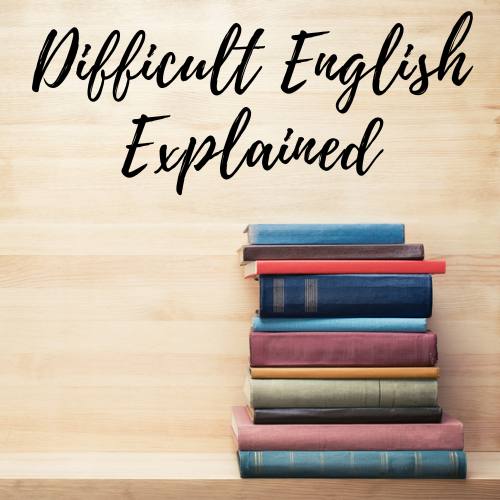Video available at: https://youtu.be/Rk311i1E7KI

Today I want to talk about a particular group of English adjectives. These adjectives start with the prefix, “a-“. To understand them, we first have to talk about where adjectives can appear in a sentence. They can be:
- before a noun. (attributive position)
- after a verb. (predicative position)
- after the object of a verb. (postnominal predicative position)
Some adjectives, like “yellow,” can appear in any of these three positions.
- A yellow bus just passed by the school. (attributive position)
- The school bus is yellow. (predicative position)
- Let’s paint the school bus yellow. (postnominal predicative position)
But there is a set of adjectives that can only appear after a verb. These adjectives are made by adding the prefix “a-” to a verb or noun. This “a-” prefix has nothing to do with the Greek prefix which means “not” or “without.” It is derived from the Middle English preposition “an”, which means “in” or “on.” Middle English is the form of English that was spoken from about 1150 AD to 1500 AD.
How can you tell the Greek “a-‘” and the Middle English “a-” apart? The Greek prefix attaches to adjectives to form an opposite. The “a-” is stressed. An example would be “typical” and “atypical.” The Middle English prefix “a-” attaches to verbs and nouns and is unstressed. An example would be “sleep” and “asleep.” Here are some examples in sentences:
- My daughter is asleep. (a + sleep)
- My old cat is still alive. (a + live)
- The ship is still afloat. (a + float)
- Spending time with my child makes me feel alive. (a + live)
None of these adjectives can be used in front of a noun. If the “a-” adjective is based on a verb, you must change it to the progressive form of the root verb if you want to get a similar meaning. For example, you must say, “my sleeping daughter.” You can’t say, “my asleep daughter.”
- my sleeping daughter (not my asleep daughter)
- a living cat (not an alive cat)
- a floating ship (not an afloat ship)
In the examples that I gave, the root verbs for the adjectives are still used in modern English. There are, however, several of these adjectives that are still used, but their root verbs are no longer in use. Here are some examples:
- aghast
- amiss
- aware
- awry
Conclusion
Adjectives that start with the “a-” prefix come from an earlier period in the English language. The “a-” prefix is based on a preposition from Middle English. This preposition has disappeared. It was replaced by two different prepositions — “in” and “on.” It’s very unlikely that you will see any new adjectives with this prefix since the word it was based on is long gone.
References
Huddleston, R. D. & Pullum, G. K. (2002) The Cambridge grammar of the English Language, Cambridge, England: Cambridge University Press.
Online Etymology Dictionary, https://www.etymonline.com/word/ajar#etymonline_v_8085, accessed Oct. 20, 2022
Swan, M. (2005) Practical English Usage, Oxford, England: Oxford University Press.
Did you like this blog post? If so, support me with a donation through Buy Me a Coffee!
Get notifications of new blog posts on my Telegram channel. Register at https://t.me/diffengexplnd.
